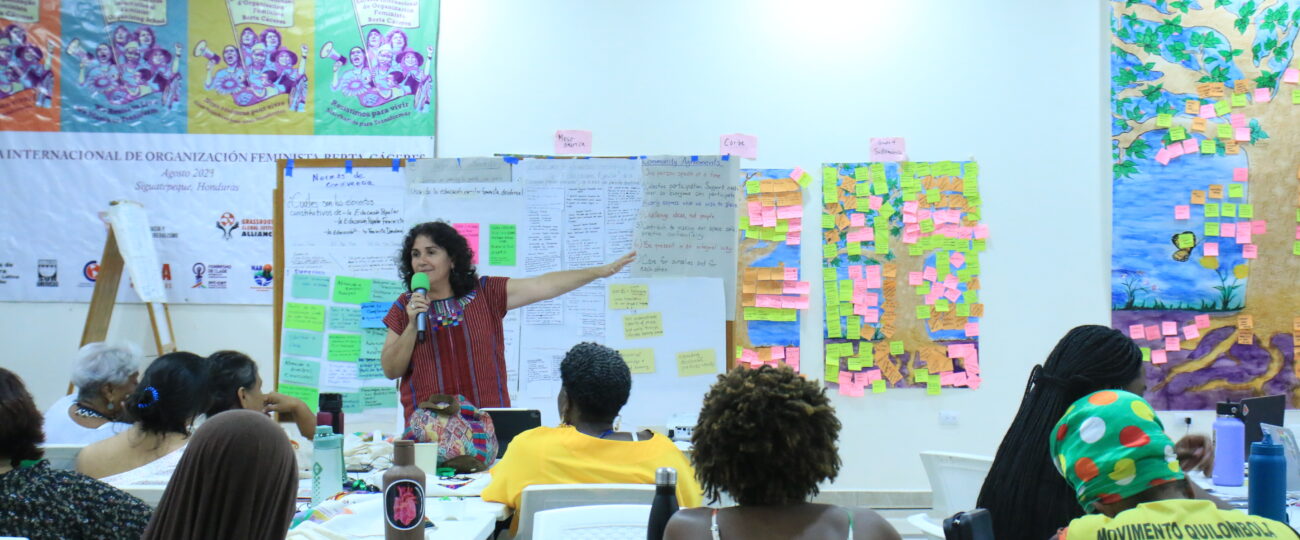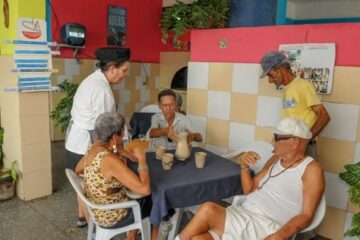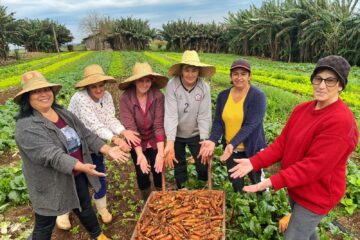When addressing feminist popular education, we not only have to read about domination, but also be able to cherish hope for the world, looking at it as something we build and can change. We start from what we are already building, aware that it is not enough, yet it is still necessary and pressing. By looking at this hegemonic power and this deadly system, we recognize the pattern of power implemented since colonial times in our territories.
As a colony, life and work were rationalized and sexualized. Men, women, and the peoples were defined and assigned work based on the color of their skin, and accumulation and commodification structures were implemented. Everything started to be traded. We cannot separate these systems of domination. A capitalist contradiction cannot be understood without its interconnections with colonialism and patriarchy.
We are experiencing a neocolonial process. Colony is not an expression from a historical past, but rather a way of building society that has been moving over time. Today, it reaffirms a way of taking from us everything that is on and under the land.
People’s bodies become part of the looting that rules and controls us. Different interconnected forms of violence must be identified. When a mining business comes to a new territory, for example, they come with a military structure and cases of sexual violence become worse, bodies are controlled, people become political prisoners. One form of violence cannot be separated from the others.
Hegemony will come from all that is rebellious. Our non-normative bodies already imply a rebellion that does not please, that disrupts normality. These rebellious bodies have been rendered invisible and controlled over the course of history. Poverty has been feminized and neoliberal policies have become deeper and deeper through fundamentalisms that adopt specific strategies to control bodies that are rendered invisible.
We have those same scars, even when we are educators in spaces of feminist popular education. Our life stories are painful, full of fears, guilt, and other traces of this model on our bodies. So we need processes in which we are also building it. We, women, dissident bodies, and Indigenous peoples, conceive life differently, expressed in cosmogonies, moon cycles, and our own hormonal changes. All that continuously generates and regenerates life, which is not given nor determined. To think that change is possible is what drives us to propose a feminist popular education. Resistance is feminized because every day women are addressing the access to water, the role of care, waging struggles against extractivist processes. We have not been named, but we have been doing it.
Political education continues to be part of this fundamental strategy for building and deconstructing hegemonic forms of thought. Just like we talk about a threefold power—capitalism, colonialism, patriarchy—, from different converging spaces we are also talking about emancipation. It is urgent to think about how to build a political subject that is capable of outlining our political project. The dimensions of emancipation have to be tightly tied, just like domination is.
Addressing popular education necessarily includes a feminist and decolonial approach to it. However, our processes of popular education come from a revolutionary tradition that understood life only through the contradiction of exploitation, without incorporating domination as part of the strategy of exploitation. This is why we still have many organizations that talk about popular education but do not unravel patriarchal and colonial components. We started to disrupt the very processes of popular education when we started to add corporeity to it, to talk about how we think, feel, love, and how we see all that as political dimensions. From that starting point, we started to provide other keys to a different popular education.
Feminist popular education allows us to discuss: what do we need to constitute ourselves as political subjects? What is the political project we believe in? How are we going to put flesh on this emancipation? Some possibilities allow us to get closer to this proposal. One of them reclaims different forms of wisdom-knowledge and situates the dimension of the natural generation of the world. From there, we start to reconsider our epistemological sources and learn about Earth’s healing abilities.
As we meet, not only do we recognize each other, but we are also learning to love each other. You cannot build a horizon and a life project with someone you do not know. We need to know who we are. Processes of feminist popular education allow us to do this: to get closer and learn about our differences and connections.
Feminist popular education is so bold, it starts to address dissident bodies from the peoples. It is not exclusive education, but its starting point is the invisible, which is made of the unnamed bodies.
We survive. We are here, living, after more than 500 years of the invasion of Latin America. We have experienced the accusation of a contradiction, as if women’s struggles for their territories and rights were demands, but not political. But they are.
When the coup happened here in Honduras, the question “what do I do with this fear?” was raised very powerfully. We were afraid to go out, we feared our daughters would not come back, that something could happen to our children… As educators, we have lifted that fear. From fear, we have generated other strengths to struggle and change. We need to heal, to be able to speak, to have spaces of trust. Our educational spaces must be spaces of tenderness and great political trust in all of the dimensions of this word.
How do we take care and depatriarchalize our methodologies? How do we conduct processes of dialogue? How do we work on a different way of managing time? How do we reclaim our own wisdom-knowledge, our denied histories? We start with the idea that, today, we must create new thought devices, but we do not deny what the peoples have accumulated. As educators, we conduct these processes by sowing suspicion, the question, and the ability to respond.
Feminist pedagogy born from the academy is not enough. We must connect with everyday concrete experiences from movements and struggles on the ground, which provide us many answers. We cannot be separated into sectors. We must connect with each other and build alliances and platforms in movement. Decolonial, feminist popular education has the ambition to revolutionize popular education itself and fill it with meanings that contribute to depatriarchalize, decolonize, and decommodify life.
Verónica del Cid is from Guatemala and coordinates the Mesoamerican Popular Education Network—Red Alforja. This article is an edited version of her lecture at the International Feminist Organizing School for Facilitators (IFOS) held in Honduras in August 2024.




